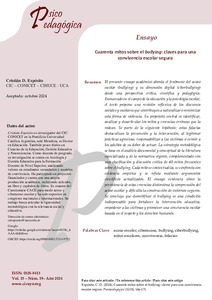Please use this identifier to cite or link to this item:
https://repositorio.uca.edu.ar/handle/123456789/20043| Título: | Cuarenta mitos sobre el bullying: claves para una convivencia escolar segura Forty Myths About Bullying: Keys to Safer School Coexistence |
Autor: | Expósito, Cristián David | Palabras clave: | BULLYING; CYBERBULLYING; CONVIVENCIA | Fecha de publicación: | 2024 | Editorial: | Centro de Investigaciones Cuyo | Resumen: | El presente ensayo académico aborda el fenómeno del acoso
escolar (bullying) y su dimensión digital (ciberbullying)
desde una perspectiva crítica, científica y pedagógica.
Enmarcado en el campo de la educación y la psicología escolar,
el texto propone una revisión reflexiva de los discursos
sociales y escolares que contribuyen a naturalizar o minimizar
esta forma de violencia. Su propósito central es identificar,
analizar y desarticular los mitos y creencias erróneas que la
rodean. Se parte de la siguiente hipótesis: estas falacias
obstaculizan la prevención y la intervención, al legitimar
prácticas agresivas, responsabilizar a las víctimas o eximir a
los adultos de su deber de actuar. La estrategia metodológica
se basa en el análisis documental y conceptual de la literatura
especializada y de la normativa vigente, complementado con
una clasificación y discusión crítica de 40 mitos frecuentes
sobre el bullying. Cada mito se contextualiza, se confronta con
evidencia empírica y se refuta mediante argumentos
científicos actualizados. El ensayo evidencia cómo la
persistencia de estas creencias distorsiona la comprensión del
acoso escolar y dificulta la construcción de entornos seguros.
Se concluye que desmitificar el bullying es una condición
indispensable para fortalecer la intervención educativa,
empoderar a las víctimas y promover una convivencia escolar
basada en el respeto y los derechos humanos. This academic essay addresses the phenomenon of school bullying and its digital dimension (cyberbullying) from a critical, scientific, and pedagogical perspective. Framed within the fields of education and school psychology, the text offers a reflective analysis of social and educational discourses that tend to normalize or downplay this form of violence. Its central purpose is to identify, analyze, and dismantle the myths and misconceptions that surround it. The underlying hypothesis is that these fallacies hinder both prevention and intervention efforts by legitimizing aggressive behavior, blaming victims, or absolving adults of their responsibility to act. The methodological approach is based on a documentary and conceptual analysis of specialized literature and current regulations, complemented by a classification and critical discussion of forty prevalent myths about bullying. Each myth is contextualized, contrasted with empirical evidence, and refuted through up-to-date scientific arguments. The essay shows how the persistence of these beliefs distorts the understanding of school bullying and hinders the construction of safe environments. It concludes that debunking these myths is essential to strengthening educational intervention, empowering victims, and promoting school coexistence grounded in respect and human rights. |
URI: | https://repositorio.uca.edu.ar/handle/123456789/20043 | ISSN: | 0328-5413 | Derechos: | Attribution-NonCommercial-NoDerivatives 4.0 Internacional | Fuente: | Psicopedagógica. Psicología y Pedagogía de la Persona. 2024, 15(19) |
| Appears in Collections: | Artículos |
Files in This Item:
| File | Description | Size | Format | |
|---|---|---|---|---|
| cuarenta-mitos.pdf | 827,23 kB | Adobe PDF |  View/Open |
This item is licensed under a Creative Commons License

